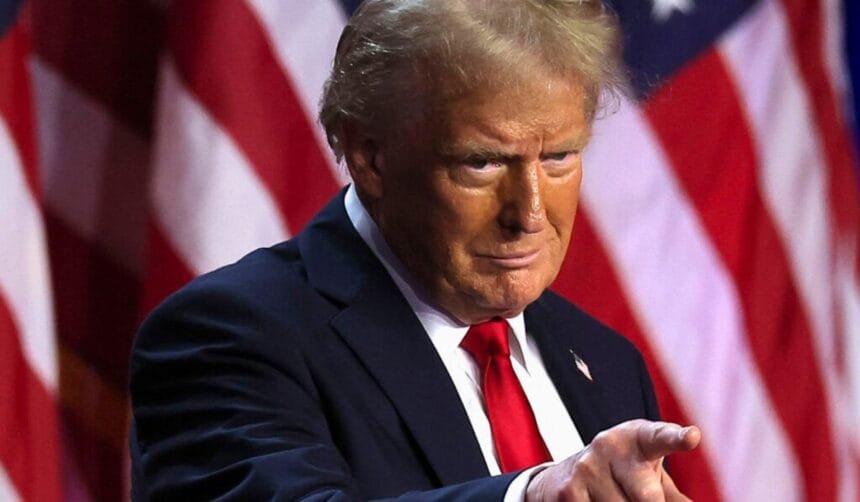Trump’s promise to end birthright citizenship during a possible second term has sparked a new round of heated debates about immigration and how to read the Constitution.
As Trump describes plans to challenge the longstanding practice enshrined in the 14th Amendment, legal scholars, politicians, and civil rights groups are preparing for an intense fight.
Birthright citizenship, which says that everyone born in the U.S. is a citizen, no matter what their parents’ legal status is, has been an important part of American democracy since it was made official in 1868.
Its roots go back to after the Civil War, when people who had been slaves were trying to get citizenship. Trump’s plans to act against this basic principle would have huge effects on the whole country.
The Foundation of Birthright Citizenship
The 14th Amendment unequivocally states:
“All persons born or naturalized in the United States, and subject to the jurisdiction thereof, are citizens of the United States.”
This provision has been interpreted for over a century to mean that anyone born on U.S. soil—excluding foreign diplomats—is automatically a citizen.
The 1898 Supreme Court case United States v. Wong Kim Ark affirmed this interpretation, declaring that children born in the U.S. to non-citizen parents lawfully residing in the country are citizens.
Conservative groups argue that the phrase “subject to the jurisdiction thereof” has been misapplied, contending it excludes children of undocumented immigrants.
Trump’s allies hope that a conservative-leaning Supreme Court, now featuring three justices he appointed, will reconsider the provision’s scope.
Trump’s Plan: Executive Action and Legal Challenges
Trump has pledged to end birthright citizenship on “Day One” of his second term, suggesting executive action as a primary tool. While he has not outlined specifics, potential measures could include:
- Denial of Passports: Refusing to issue passports to children of undocumented parents.
- Exclusion from Benefits: Restricting access to welfare and public benefits.
- Legal Challenges: Intentionally provoking lawsuits to bring the issue before the Supreme Court.
Experts widely agree that such unilateral action would face immediate legal challenges. The Constitution’s language and judicial precedents are robustly against altering birthright citizenship via executive order.
According to Amanda Frost, a University of Virginia law professor, “The Constitution means what five members of the Supreme Court say it means.”
While this reflects the power of the judiciary, the procedural and historical weight of the 14th Amendment makes overturning birthright citizenship a herculean task.
Legal and Political Hurdles
If Trump goes ahead with his plans, they will probably lead to long court battles that will delay any possible changes.
Another option is to change the Constitution, but that needs a two-thirds majority in both the House and the Senate, as well as approval from three-quarters of state governments. In today’s divided political climate, this is almost impossible to achieve.
Scholars also say that stopping birthright citizenship would go against what the amendment was meant to do in the first place.
“The 14th Amendment was meant to end caste in America,” Frost warns. That might happen again with this.”
Supreme Court’s Role in Shaping the Debate
The present conservative majority on the Supreme Court gives people who want to limit interpretation a glimmer of hope.
Cases like Dobbs v. Jackson Women’s Health Organization show that the court is ready to break long-standing rules when their views are in line with them.
Hans von Spakovsky of the Heritage Foundation says that immigration policies might change after a final decision is made on birthright citizenship.
“This case was last heard in 1898.” “The Supreme Court may agree with what Trump did when they look at this,” he said.
Critics, on the other hand, say that a change like this is rare because the court has always stuck to the Constitution and previous decisions.
Says Adam Winkler, a law professor at UCLA: “There is no legal understanding to support the argument that undocumented immigrants are not subject to U.S. jurisdiction.”
Broader Implications for Immigration Policy
Trump’s push to end birthright citizenship aligns with wider immigration policies, including mass deportations and stricter border controls.
His rhetoric about the economic and social costs of illegal immigrants hits home with his supporters, but pro-immigration groups are against him.
A lot of civil rights groups think that Trump’s position is bad and divides people. A co-executive head of the Immigration Hub named Beatriz Lopez said, “We take Trump at his word and his track record…” His ideas go against any claim that he is trying to find a middle ground.
Also, not letting children born in the U.S. become citizens could lead to a stateless population, which would make it harder for them to get basic rights like healthcare, schooling, and more.
The Path Forward
Trump’s plan may or may not work depending on how the law is interpreted, how the public feels, and how politicians move.
Constitutional amendments have always been a reflection of how societal values change over time. They often take decades of advocacy and building agreement to make happen.
For now, Trump’s plan to end birthright citizenship is still a controversial problem that shows how hard it is for Americans to agree on immigration reform as a whole.
As the debate unfolds, its result could redefine what it means to be an American in the 21st century.



